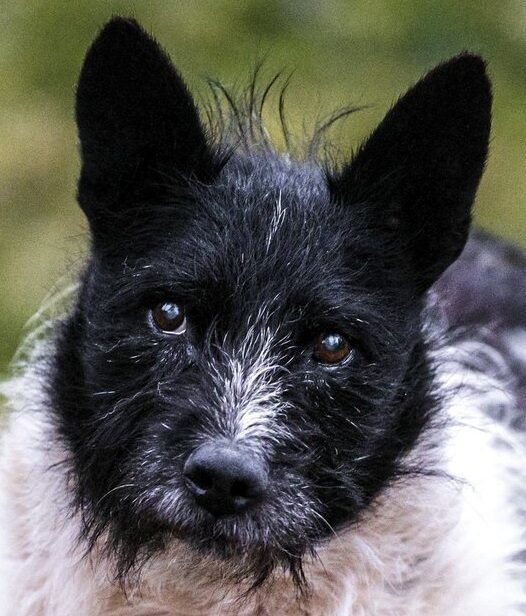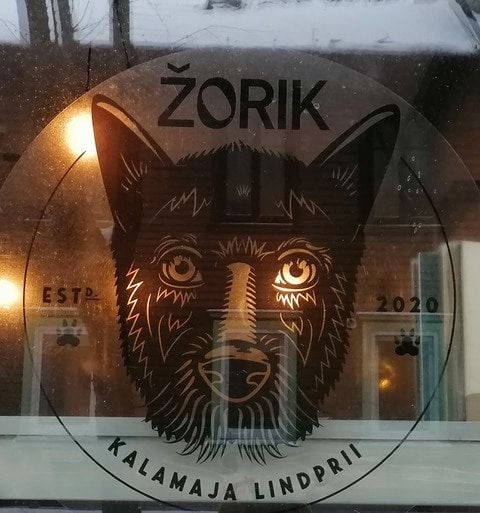Žorik was mentioned in the article describing the Kassi/abi cat shelter calender on this page two weeks ago.
The legendary, elderly (14+ year-old), ailing Kalamaja neighborhood lind/prii (outlaw, “bird free”, free as a bird), as he is known, was safely retired to an outdoor enclosure in the countryside this past summer (although he managed to escape once!), after he began lying down in dangerous spots including the rongi (train) and trammi tracks of Põhja-Tallinn. Luckily, he was known and looked out for by the tram drivers. The krants (mutt) with as many lives as a cat’s, emerged valiantly from seizures and an ensuing coma while in the care of a looma/arsti (veterinary) kliinik in September, much to everyone’s amazement.
He is the last of a one-time large family of free-ranging dogs from Põhja-Tallinn’s Paljassaare peninsula, the only one that avoided capture, although never having been known to be aggressive or bite. While allowed to live in a makeshift shelter in Paljassaare harbor, he was known as Ugaljok, meaning “little piece of coal” in Russian, because of his mostly white (and black) body, yet entirely dark head and “smart” eyes. He was seen with other dogs, including his brother, who all eventually disappeared while he moved on between neighbourhoods depending on the winds of change.
Now Žorik has been immortalized by sculptor Kain Rezev with funds donated by the public, who miss the raudne (steely, “iron”) pup. Led by Looma/pääste/grupp MTÜ (non-profit Animal Rescue Group’s) Heiki Valner, the statue was unveiled in front of the Arsenali shopping center in the extended neighborhood Žorik called home on World Animal Day, 4. oktoober 2020. It is a testament to surviving the odds and a reminder to not forget those in need, such as the kitten between his paws (Žorik got along well with cats), as well as to not discriminate, since Žorik’s network of friends transcended local cultural and social divides. The story of the cunning, evasive free-spirit, who has never let people very close, yet won their hearts, reverberated worldwide thanks to the AP News article “Estonians erect statue and give home to beloved stray dog” of December 17, penned by Maris Hellrand.
Žorik now joins other famous canine monuments such as Greyfriars Bobby in Edinburgh, Hachikō at Japan’s Shibuya train station and Rover in front of the Hartford Hospital, who all loyally awaited their masters long after their deaths, as well as sled-dog Balto in NY’s Central Park and President Roosevelt’s Fala. Since 2011, there is also a bas-relief plaque in Tartu’s Supilinn, commemorating legendary dog Riku, who was a quiet, friendly fixture in front of a single-story old wooden house on Tähtvere tänav from 2002 to 2007. The house was demolished a few years ago and a new one built, onto which the old plaque has once again been mounted.
Back in the capital, in an ironic mix of admiration meets gentrification, a new kohvik (café) / baar at Tööstuse tänav 1 now bears Žorik’s name. One of the owners has said they agreed long ago to donate money raised by the sale of sweatshirts and t-shirts bearing Žorik’s logo to support him and other homeless animals, as well as to put a donation box in the café. Žorik’s saga is definitly worth remembering and the owners of the establishment insist they too wish to honor his memory by helping to keep his legend alive, even aften he has travelled to better hunting grounds, as Estonians say: läinud parematele jahi/maadele, where there are endless Žorik burgers – mahe/veise/pihv (organic beef patty) on brioche, hold the hoisin kurk and togarashi sibul. Or perhaps he will forever prefer vares (crow) on the bone.
Riina Kindlam, Tallinn


















